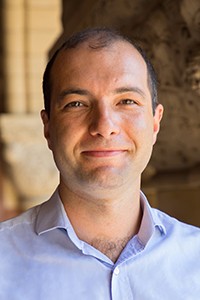Young Scientist Conversation with Cengiz Pehlevan

1) Would you please tell us about yourself and your journey that led you to become a scholar.
While I am a curious person by nature and enjoy learning new things, being a scientist wasn’t in my mind when I started Bogazici University as an undergraduate. I was an industrial engineering major, planning to go into banking or consulting afterward. After a year it didn’t feel right, so I switched majors to electrical engineering. It felt better, but I realized that I was more interested in sciences than engineering, so I did a double major with physics. During these years, I got interested in two questions. One was the brain and how it led to cognition. The other was whether a unified theory of physics existed and if so what would it be. I wanted to stay in academia to learn much more about these subjects.
I went to Brown University’s physics Ph.D. program, which offered opportunities in both areas. I ended up working with Gerald Guralnik on theoretical and computational approaches to particle physics. Towards the end of my graduate studies, I decided to change fields, again, to the study of the brain and looked for postdoctoral positions in theoretical neuroscience. Fortunately, I was awarded a Swartz Fellowship at Harvard, where I worked with Haim Sompolinsky, Bence Olveczky, and L. Mahadevan. Continuing in this field, I held postdoctoral and research scientist positions in Dmitri Chklovskii’s groups at Janelia Research Campus and the Flatiron Institute. Since the beginning of 2019, I am an assistant professor of applied mathematics at Harvard University.
2) Tell us about your research and how it is related to everyday life or other fields.
My research area is theoretical neuroscience. I want to understand the brain as a computing machine by uncovering its algorithms and their implementation at the network and cellular levels. But how can we infer what and how the brain computes from the large datasets of modern neuroscience? For that, we need “algorithmic” theories that bridge computation and its biological realization. I develop such theories. I collaborate frequently with experimentalists to ask and answer related questions.
One problem I am thinking about is how the brain processes sensory inputs. The brain is a very efficient data processing machine. We are very good at extracting important information from streams of huge amounts of data. For example, it is estimated that about 10 billion bits of information is deposited on our retinas every second, which gets reduced to roughly 10 million bits per second at the retina’s output to the rest of the brain, and the information content of what we are consciously aware is much less. What are the algorithms involved in this process? What problems are these algorithms solving? How does the brain’s hardware compute these algorithms? Such questions are what I explore.
Understanding the brain’s algorithms will naturally lead to better artificial intelligence, and I pursue such engineering applications of my work. I also recently got interested in neuromorphic computing. I started to use the lessons I learned from studying the brain to build efficient algorithms designed to run on neuromorphic hardware.
3) What do you consider important to your success? Tell us about any skills or habits that you think helped you to become a successful scholar at such a young age.
First, thank you for finding me young and successful.
I wasn’t sure how to answer this question, so I asked my wife, who is also a scholar. She says:
“The ability to focus. Cengiz’s work has always been the top priority, as I am sure it is for many researchers. However, what is key is his ability to concentrate on his work irrespective of the circumstances. It is more like learning to compartmentalize your brain. Another point is never being intimidated to work on new topics and explore uncharted territories. Courage is at the heart of research."
I should add that luck and coincidences also played an important role.
4) What are your immediate and long-term goals for the future?
I started my faculty position very recently. For now, I am focusing on building a productive group and establishing my research program. For the rest of my career, I want to contribute as much as I can to the quest of understanding the brain and intelligence.
5) What do you recommend to aspiring scholars, or to young Turkish scientists/scholars who are at the beginning of their careers?
Everybody’s circumstances are different, what works for one does not necessarily work for others. With this caveat, here are a few things. Work in a field that you are passionate about, because science requires strong dedication and motivation. Find good and supportive mentors, but also understand that at the end it is your responsibility to steer your career in the right direction. It helps every now and then to take time and think about where you are at that moment and where you are going. Building a network is very important, take it seriously.
6) Could you please tell us about your life outside of your work? Do you have hobbies? What are your favorite activities? If you recommend a book, what would that be and why?
Music is another passion of mine. I play the baglama, cumbus and ud. I used to play with Boston Meyhanesi and other groups, and perform around Boston area.
The Hitchhiker’s Guide to the Galaxy is one of my favorite novels. I find Douglas Adams’ writing brilliantly funny and relaxing. Asimov’s Foundation Triology is another favorite. I don’t know anything else like it. I like Kemal Tahir’s use of the Turkish language, I enjoy reading his novels.